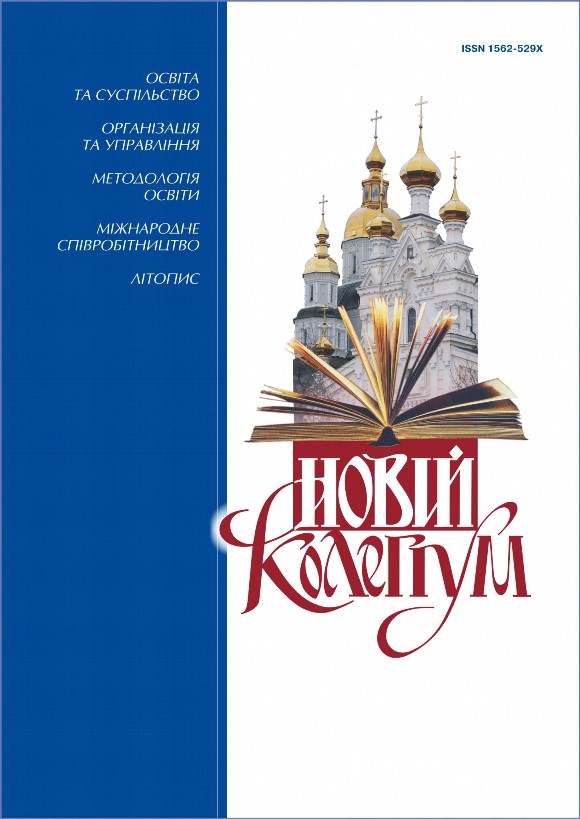Methodological perspectives of using Ulrich Beck's society's concept of risk for the training of higher education students in sociology
DOI:
https://doi.org/10.30837/nc.2023.4.93Keywords:
methodology, risksociety, U. Beck, science, riskAbstract
The article argues the thesis about the potential of U. Beck's concept of risk society as a methodological basis of the educational course for students of higher education in the specialty "Sociology", which aims to produce knowledge, soft skills and competences capable of ensuring the effectiveness of the adoption of civic, professional and managerial decisions by future specialists.
Based on the research of primary sources, the authors try to analyze the basic views of the classics of this sociological direction on the social nature of risk as a constituent of social in modern societies, the essence of which is that the "positive" logic of social production, which prevailed in industrial society, consisted in the accumulation and distribution of wealth , is increasingly overlapped (suppressed) by the "negative" logic of risk production and distribution. Ultimately, the expanding production of risks undermines the very principle of market economy and private property, as the produced public wealth is systematically devalued and expropriated.
The diversity of the roles of science in the formation of the ideology and politics of modern society is considered. The concept of "risk society" claims that with the expansion of the production of risks, the role of science in social life and politics changes significantly, because most of the risks generated by the successes of scientific and technical modernization, and the most dangerous (radioactive and chemical pollution, uncontrolled consequences of genetic engineering) are not directly perceived by human senses. Hence, experts responsible for determining the degree of riskiness of new technologies and technical systems, as well as mass media that disseminate knowledge about them, "acquire key social and political positions."
The article argues the thesis about the potential of U. Beck; concept of risk society as a methodological basis of the educational course for students of higher education in the specialty; Sociology, which aims to produce knowledge, soft skills and competences capable of ensuring the effectiveness of the adoption of civic, professional and managerial decisions by future specialists.
Based on the research of primary sources, the authors try to analyze the main views of the classics of this sociological direction on the social nature of risk as a constituent of social in modern societies, the essence of which is that the "positive" logic of social production, which prevailed in industrial society, consisted in accumulation and distribution wealth, is increasingly overlapped (suppressed) by the "negative" logic of production and distribution of risks. Ultimately, the expanding production of risks undermines the very principle of market economy and private property, as the produced public wealth is systematically devalued and expropriated.
The variety of roles of science in the formation of ideology and politics of modern society is considered. The concept of "risk society" claims that with the expansion of the production of risks, the role of science in social life and politics changes significantly, because most of the risks generated by the successes of scientific and technical modernization, and the most dangerous ones (radioactive and chemical pollution, uncontrolled consequences of genetic engineering) are not perceived directly human senses. Hence, specialists responsible for determining the degree of riskiness of new technologies and technical systems, as well as mass media that disseminate knowledge about them, "acquire key social and political positions".
References
Бек У. Жизнь в обществе глобального риска – как с этим справиться: космополитический поворот // Германия сегодня и завтра. 2012. № 10. С. 1 – 13.
Бек У. Молчание слов и политическая динамика в глобальном обществе риска. [Електронний ресурс]. Режим доступу: www.academy-go.ru/Site/GrObsh/Publications/Beck5.shtml
Лукашевич М., Недюха М. Суспільство ризику. Соціологічна енциклопедія ; укл. В.Г. Городяненко. Київ : Академвидав, 2008. 456 с.
Ризик (risk) // Короткий оксфордський політичний словник ; за ред. І. Макліна, А. Макмілана. Київ : Основи, 2006. 792 с.
Тарасова О. А. У. Бек і Е. Гідденс про суспільство ризику // Соціальні технології: актуальні проблеми теорії та практики : зб. наук. праць. Класичний приватний ун-т. Запоріжжя, 2019. Вип. 83. С. 53 – 58.
Beck’s. Theory of Risk Society of Modernity: Definition and Speciality of Risk Society. [Електронний ресурс]. Режим доступу: http://www.yourarticlelibrary.com/sociology/becks-theory-of-risk.

